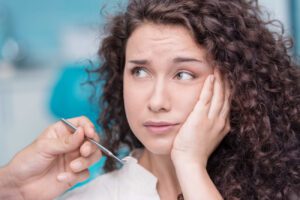Bruxism, more widely known as teeth grinding, affects millions of people. And because most people grind their teeth at night while they are asleep, many don’t know they have the condition. Dr. Sheen is able to diagnose and recommend treatment options for Bruxism. During routine dental care or your first visit with us, our dentist in Annapolis, MD looks for common signs of teeth grinding: worn teeth, cracked or chipped teeth, and even receding gums.

Teeth Grinding Causes
Approximately 10-15% of Americans moderately to severely grind their teeth. There are several different reasons people grind their teeth, most commonly:
- Stress or anxiety
- Malocclusion (improper alignment of the teeth)
- Temporomandibular Joint Dysfunction (TMD)
- Parkinson’s or Huntington’s Disease
Teeth Grinding Symptoms
Because most people grind their teeth in their sleep, you must be aware of the symptoms to know that the condition is taking place. These include:
- Worn, flattened, fractured, or chipped teeth
- Worn tooth enamel
- Tooth sensitivity
- Jaw pain or tightness in the jaw muscles
- Earache
- Headache
- Facial pain
- Damaged tissue on the inside of your cheek
Teeth Grinding Treatment
Dr. Sheen is usually able to diagnose Bruxism through a quick visual examination. He works with patients on an individual basis to diagnose the underlying cause for a lasting result from treatment. Options for treatment depend on the severity and cause of your teeth grinding. A conservative first step is often a mouthguard to wear during sleep.
Teeth Grinding Night Guard
A teeth grinding night guard is a custom-made, removable appliance that fits over your teeth to prevent grinding and jaw clenching. Many choose to wear the guard at night while they are sleeping, when they experience the most grinding. You also have the option to wear them in high-stress situations, such as while driving or at work.
A custom mouthguard obtained through a dentist office assures that it will fit properly. They also tend to be of higher quality, will last longer, and are more comfortable. Dr. Sheen will just need impressions of your teeth at one visit, and at the next visit, you will try it to check for comfort and fit.
Bite Correction
Dr. Sheen may also perform a bite correction procedure to treat teeth grinding. This often includes replacing missing teeth with dental implants or a dental bridge. Having just one missing tooth will cause the neighboring teeth to shift. This will can easily cause your bite to not function properly.
Abnormally shaped teeth can also cause your bite to be off. We offer several treatments that can change the shape of your teeth. Dental crowns are one option. They fit over a tooth, completely encasing it, and can be placed in a single visit with CEREC technology.
Another option that can change the shape of your teeth is dental veneers. Dr. Sheen can bond porcelain veneers to the front and sides of your teeth. Implants, crowns, and veneers are all great options that will help the teeth to make proper contact with one another.
Teeth grinding is not something you should have to live with. Annapolis-based dentist Dr. Sheen can diagnose and treat teeth grinding and other dental concerns you may be having easily and effectively. Contact us today, we are accepting new patients.
